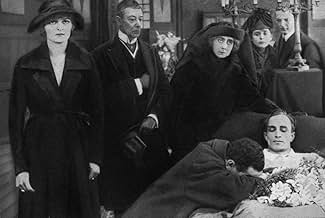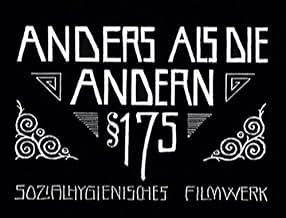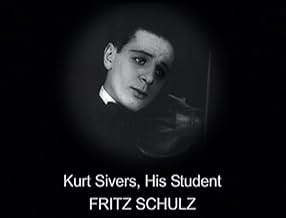IMDb रेटिंग
7.0/10
1.6 हज़ार
आपकी रेटिंग
अपनी भाषा में प्लॉट जोड़ेंTwo male musicians fall in love, but blackmail and scandal makes the affair take a tragic turn.Two male musicians fall in love, but blackmail and scandal makes the affair take a tragic turn.Two male musicians fall in love, but blackmail and scandal makes the affair take a tragic turn.
- निर्देशक
- लेखक
- स्टार
फ़ीचर्ड समीक्षाएं
This film deals with a prosperous man who encounters a sleazy blackmailer who discovers that he is gay. (This silent rarity is a good reason for film preservation!)
A much later film "Victim", deals with a similar subject.
A much later film "Victim", deals with a similar subject.
Conrad Veidt plays a famous musician who is blackmailed for being gay. Eventually he stands trial and is convicted. At the end the Film pleads for the abolition of § 175(The Paragraph which punishes homosexuality).
The making of such a film was only possible because after WWI there were no Censorship laws in Germany. After a wave of sexually explicit films they were reinstalled and 'Anders als die andern' was banned for the public in Aug.1920. Not until 1957 would homosexuality be a main topic in a film again (Anders als Du und Ich).
Sadly this historic film is lost. But Portions of it were incorporated into another film (Gesetze der Liebe/Laws of Love,1927) and survived. These have been restored to a length of 41 min..
The making of such a film was only possible because after WWI there were no Censorship laws in Germany. After a wave of sexually explicit films they were reinstalled and 'Anders als die andern' was banned for the public in Aug.1920. Not until 1957 would homosexuality be a main topic in a film again (Anders als Du und Ich).
Sadly this historic film is lost. But Portions of it were incorporated into another film (Gesetze der Liebe/Laws of Love,1927) and survived. These have been restored to a length of 41 min..
It is hard to vote for this film, because it is really just the shreds of a film. The odd thing is that ONLY the parts of the story relevant to gay sensibilities remain: the relationship between the violinist Paul Körner (Veidt) and his youthful protegé, the scenes of all-male partying, Paul making a pass at the man who turns out to be a blackmailer, and apparently the slide-show lecture on the sexual continuum (though perhaps this was reconstructed from the historical sexologist's actual slide shows?). Besides this, there is the skeleton of the legal plot: Paul reading about suicides and knowing what's behind it, the judge giving the blackmailer 3 years and Paul one week, and Paul coming home to kill himself.
What you don't see is any scene at all with a woman in it, except for one where young Paul runs in terror from a whorehouse. Evidently there were two sets of parents and a young woman all active in the original film, and they all ended up being cut from the final film.
There is not much development of the character of the boy Paul loves--it is not quite clear from the end whether he mourns Paul as a self-sacrificing friend, a great violinist, or the love of his life. Paul himself, in an extended flashback, evidently realized he was gay at the moment a whore kissed him; the fill-in titles explain that a young woman of dubious morals kissed the boy at a point after his story has disappeared from the surviving clips of the film. So presumably the boy has realized that, since he does not like being kissed by a woman, he must be gay and love Paul after all. It's an odd logic, redeemed only by Veidt's combination of sensuality and morality (great moment when he starts eagerly kissing a pick-up and then is horrified when the man asks for money).
Veidt is pretty amazing. The man played vampires or at least exotic sexual predators, Jews, Nazis in Allied films, a Devil's Island inmate--every kind of marginal monster; in one movie he seems to be playing Jesus. When he played kings, he played them mad and/or deformed. Yet he gave every character an edge, a dignity, a strength that made you feel it wasn't right if he got shot in the back. In this film, he looks rather like Cesare from Cabinet of Dr. Caligari but the same skeletal-elegant physique and haunted quality (and haunted makeup) become expressions of human sorrow, longing, and a frail nobility of character.
It is interesting to compare this film to Victim, made 42 years later. In both stories, the protagonist is a man who discovered and explored his sexual feelings for other men as a schoolboy; as a mature adult, having achieved a position of great prestige, he becomes involved in an unconsummated relationship with a much younger man who admires him passionately. In both stories, a law makes homosexuals an easy target of blackmailers, and both men attempt to defy the blackmailers and the law. In the 1919 movie, however, Körner, after attempting to redirect his sexual desires by various means, accepts himself as the way he is and lives a gay lifestyle (or so we may assume from his activities at the drag ball). When he is confronted with the prospect of marriage, he sends his parents or prospective girlfriend to a sexologist so that they, too, can accept him as he is. If he does not try to seduce his protegé, it is presumably from a sense that it would be wrong to exploit his position of power over a very young, indeed virginal, student (and the boy is horrified when he realizes that the relationship is potentially sexual). Melvin Farr, on the other hand, has succeeded in redirecting his sexual desires: he is married to a cool blonde and together they are confident that he is, if not completely heterosexual, completely monogamous. No gay bars for him. The boy with whom he is in love, on the other hand, is frankly gay and would like to seduce his hero. In both stories, the tragic "victim" is the man who, openly and unreservedly gay, is vulnerable to blackmail, tries to protect the man he loves, and finally kills himself. The earlier movie has a distinguished doctor arguing that there is a sexual continuum which is natural and good, and should not be subject to legal penalties or blackmail; the later movie just has examples of presumably good (eminent) men who happen to have secret homosexual sides, and the hero's nobility lies in going to bat for a working-class boy who could not keep his own sexuality secret.
I am struck by the fact that both the tragic victims look physically frail--thin, as if worn to a bone in the hope that if they turn sideways they will be overlooked by society. Both the ambiguously sexual survivors are heartier types, physically more solid and substantial, though of course Dirk Bogarde could out-edge even Veidt.
What you don't see is any scene at all with a woman in it, except for one where young Paul runs in terror from a whorehouse. Evidently there were two sets of parents and a young woman all active in the original film, and they all ended up being cut from the final film.
There is not much development of the character of the boy Paul loves--it is not quite clear from the end whether he mourns Paul as a self-sacrificing friend, a great violinist, or the love of his life. Paul himself, in an extended flashback, evidently realized he was gay at the moment a whore kissed him; the fill-in titles explain that a young woman of dubious morals kissed the boy at a point after his story has disappeared from the surviving clips of the film. So presumably the boy has realized that, since he does not like being kissed by a woman, he must be gay and love Paul after all. It's an odd logic, redeemed only by Veidt's combination of sensuality and morality (great moment when he starts eagerly kissing a pick-up and then is horrified when the man asks for money).
Veidt is pretty amazing. The man played vampires or at least exotic sexual predators, Jews, Nazis in Allied films, a Devil's Island inmate--every kind of marginal monster; in one movie he seems to be playing Jesus. When he played kings, he played them mad and/or deformed. Yet he gave every character an edge, a dignity, a strength that made you feel it wasn't right if he got shot in the back. In this film, he looks rather like Cesare from Cabinet of Dr. Caligari but the same skeletal-elegant physique and haunted quality (and haunted makeup) become expressions of human sorrow, longing, and a frail nobility of character.
It is interesting to compare this film to Victim, made 42 years later. In both stories, the protagonist is a man who discovered and explored his sexual feelings for other men as a schoolboy; as a mature adult, having achieved a position of great prestige, he becomes involved in an unconsummated relationship with a much younger man who admires him passionately. In both stories, a law makes homosexuals an easy target of blackmailers, and both men attempt to defy the blackmailers and the law. In the 1919 movie, however, Körner, after attempting to redirect his sexual desires by various means, accepts himself as the way he is and lives a gay lifestyle (or so we may assume from his activities at the drag ball). When he is confronted with the prospect of marriage, he sends his parents or prospective girlfriend to a sexologist so that they, too, can accept him as he is. If he does not try to seduce his protegé, it is presumably from a sense that it would be wrong to exploit his position of power over a very young, indeed virginal, student (and the boy is horrified when he realizes that the relationship is potentially sexual). Melvin Farr, on the other hand, has succeeded in redirecting his sexual desires: he is married to a cool blonde and together they are confident that he is, if not completely heterosexual, completely monogamous. No gay bars for him. The boy with whom he is in love, on the other hand, is frankly gay and would like to seduce his hero. In both stories, the tragic "victim" is the man who, openly and unreservedly gay, is vulnerable to blackmail, tries to protect the man he loves, and finally kills himself. The earlier movie has a distinguished doctor arguing that there is a sexual continuum which is natural and good, and should not be subject to legal penalties or blackmail; the later movie just has examples of presumably good (eminent) men who happen to have secret homosexual sides, and the hero's nobility lies in going to bat for a working-class boy who could not keep his own sexuality secret.
I am struck by the fact that both the tragic victims look physically frail--thin, as if worn to a bone in the hope that if they turn sideways they will be overlooked by society. Both the ambiguously sexual survivors are heartier types, physically more solid and substantial, though of course Dirk Bogarde could out-edge even Veidt.
It's a shame that about half of this film is lost, deliberately destroyed by the Nazis. What is odd is that probably the tamest portions of the film are missing - the parts with Paul Körner (Conrad Veidt) and his family, and the parts in which Paul interacts with Else, the girl who loves him. The parts that are missing though are masterfully replaced by still shots and enough inter-titles that you get a pretty good idea of how Paul gets along with his family.
The film was made after World War I during a brief time of relative tolerance for homosexuality in Germany, and rather than try to be titillating, the film tries to teach of the problems with the German law that made it a crime to be homosexual. Paul Körner is a famous violin virtuoso who harbors a terrible secret - he's gay and constantly in fear of being discovered and prosecuted under the law. As a result, you realize that Paul is a rather sad and lonely man despite his professional success, unable to openly express himself and look for a life-partner out in the open. Things change when Paul takes on a pupil, Kurt Sivers, a young man who idolizes Paul. Paul seems to really fall for Kurt, but you can tell that Kurt is still somewhat unsure of what to make of his own feelings at this point. Unfortunately, Kurt's sister Else loves Paul too, not knowing that Paul is unable to return the sentiment.
Paul is also being hounded by a blackmailer who first met him in a gay dance hall. When Paul mistook the blackmailer's advances as romantic, he took him back to his home and there the man spurned Paul and demanded money. You get the impression he's been hounding him ever since that time. What is odd is that the gay dance hall where he and Paul first met almost seems to be the blackmailer's second home, so I have to wonder why the blackmailer isn't afraid of being blackmailed himself.
There's a well done set of scenes with Paul looking back on his life - his adolescence at boarding school specifically - and the trouble he had there on account of his orientation. There's even a scene with a sexologist lecturing on homosexuality - oddly enough, this is how Paul explains to Else the truth of who he is and that his rejection of her is not personal.
Highly recommended as a good reconstruction of a lost silent film.
The film was made after World War I during a brief time of relative tolerance for homosexuality in Germany, and rather than try to be titillating, the film tries to teach of the problems with the German law that made it a crime to be homosexual. Paul Körner is a famous violin virtuoso who harbors a terrible secret - he's gay and constantly in fear of being discovered and prosecuted under the law. As a result, you realize that Paul is a rather sad and lonely man despite his professional success, unable to openly express himself and look for a life-partner out in the open. Things change when Paul takes on a pupil, Kurt Sivers, a young man who idolizes Paul. Paul seems to really fall for Kurt, but you can tell that Kurt is still somewhat unsure of what to make of his own feelings at this point. Unfortunately, Kurt's sister Else loves Paul too, not knowing that Paul is unable to return the sentiment.
Paul is also being hounded by a blackmailer who first met him in a gay dance hall. When Paul mistook the blackmailer's advances as romantic, he took him back to his home and there the man spurned Paul and demanded money. You get the impression he's been hounding him ever since that time. What is odd is that the gay dance hall where he and Paul first met almost seems to be the blackmailer's second home, so I have to wonder why the blackmailer isn't afraid of being blackmailed himself.
There's a well done set of scenes with Paul looking back on his life - his adolescence at boarding school specifically - and the trouble he had there on account of his orientation. There's even a scene with a sexologist lecturing on homosexuality - oddly enough, this is how Paul explains to Else the truth of who he is and that his rejection of her is not personal.
Highly recommended as a good reconstruction of a lost silent film.
"Anders als die Andern" (Different from the Others) is a 1919 German film starring Conrad Veidt that was pieced together and shown at one point on public television.
About a law on the books that makes homosexuality a crime, it had a very short run in Germany before being pulled, and people who attended the movie were harassed.
The lead is played by a German actor familiar to American audiences, usually for portraying a bad guy, Conrad Veidt. Despite dying in 1943, Veidt had a nearly 30-year career in films. Here he plays possibly the first gay character in cinema who, with such a law in place, is a target for a blackmailer.
A very interesting film with a wonderful performance by Veidt. Only part of the movie remains, but it has been put together as well as can be expected - it is, after all, a mere 102 years old. It's amazing how relevant some of the material in it remains today.
About a law on the books that makes homosexuality a crime, it had a very short run in Germany before being pulled, and people who attended the movie were harassed.
The lead is played by a German actor familiar to American audiences, usually for portraying a bad guy, Conrad Veidt. Despite dying in 1943, Veidt had a nearly 30-year career in films. Here he plays possibly the first gay character in cinema who, with such a law in place, is a target for a blackmailer.
A very interesting film with a wonderful performance by Veidt. Only part of the movie remains, but it has been put together as well as can be expected - it is, after all, a mere 102 years old. It's amazing how relevant some of the material in it remains today.
क्या आपको पता है
- ट्रिवियाMagnus Hirschfeld, a prominent sexologist, co-wrote the screenplay and made a cameo appearance as The Doctor, with whom Paul Korner consults. A scene resembling that of the modern-day LGBT scene existed in Weimar Germany, albeit underground, and the scene at the gay bar featured actual LGBT individuals. The screenwriter and author Anita Loos said of this period, in 1923: "Any Berlin lady of the night might turn out to be a man: the prettiest girl on the street was Conrad Veidt, who later became an international film star." (It was Hirschfeld who coined the term 'transvestism.')
- इसके अलावा अन्य वर्जनThere is an Italian edition of this film on DVD, distributed by DNA srl, "DIVERSI DAGLI ALTRI: Alle Origini Del Cinema Gay - Special Edition" (4 Films on a single DVD: Mikaël, 1924 + Fireworks, 1947 + Un chant d'amour, 1950 + Anders als die Andern, 1919), re-edited with the contribution of film historian Riccardo Cusin. This version is also available for streaming on some platforms.
- कनेक्शनEdited into Gesetze der Liebe (1927)
टॉप पसंद
रेटिंग देने के लिए साइन-इन करें और वैयक्तिकृत सुझावों के लिए वॉचलिस्ट करें
- How long is Different from the Others?Alexa द्वारा संचालित
विवरण
- रिलीज़ की तारीख़
- कंट्री ऑफ़ ओरिजिन
- भाषाएं
- इस रूप में भी जाना जाता है
- Different from the Others
- फ़िल्माने की जगहें
- बर्लिन, जर्मनी(unknown scenes)
- उत्पादन कंपनियां
- IMDbPro पर और कंपनी क्रेडिट देखें
- चलने की अवधि
- 50 मि
- रंग
- ध्वनि मिश्रण
- पक्ष अनुपात
- 1.33 : 1
इस पेज में योगदान दें
किसी बदलाव का सुझाव दें या अनुपलब्ध कॉन्टेंट जोड़ें



























